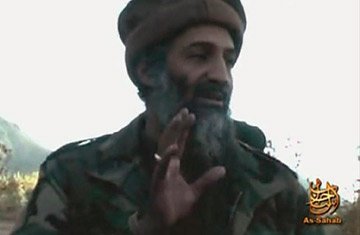
A video grab from an undated footage from the Internet shows Al Qaeda leader Osama bin Laden making statements from an unknown location.
Countless Americans might be rejoicing over Osama Bin Ladens death, but to some in the al-Qaeda leader's native region — the Arab world — the sneak operation came too late, and will do little to destroy Al Qaeda itself. While Western commentators thought President Barack Obama's announcement was the biggest of his presidency, some political analysts in the Arab region have responded almost with a shrug. "Bin Laden was neutralized more or less," says Mustafa Alani, Director of Security and Defense at the Gulf Research Center in Dubai. "He remained a major symbol, yes, but losing a symbol won't have a real impact on the organization." Despite the impressive success of the high-risk U.S. assault on Bin Ladens hideout on Sunday, he says, "killing Bin Laden is a lot easier than killing al-Qaeda."
Bin Laden's death almost a decade after 9/11 had remained a major operational goal for U.S. officials. Yet among Arab analysts, major developments since then have steadily chipped away at Bin Laden's role, leaving him as a figurehead with diminishing power even as an inspirational figure.
With Bin Laden deep in hiding, his ability to lead was hugely constrained. Others quickly emerged to fill the vacuum his absence left. One of the most important among those was Abu Musab al-Zarqawi, a Jordanian acolyte of Bin Laden, who built his devastatingly effective terror network in Iraq during the mid-2000s. In stark contrast to Bin Laden, Zarqawi honed his skills on the war front, confronting U.S. soldiers and their Iraqi allies with bombs, shootings and beheadings; in a similar operation to Sunday's, U.S. Special Forces finally tracked Zarqawi to a safehouse near Baqubah and bombed it, killing him. "At one point before Zarqawi was killed in 2006, he was more influential than Bin Laden, because he was fighting the U.S. every day," Alani says.
Others too have long since subsumed Bin Laden's role. Shortly after 9/11, says Alani, "al-Qaeda put a big S at the end of the organization," effectively creating localized off-shoots capable of operating independently, like al-Qaeda in the Islamic Maghreb, the terror groups franchise in North Africa, and al-Qaeda in the Arabian Peninsula, whose operation leader is believed to be the U.S.-Yemeni cleric Anwar al-Awlaki. Bin Laden's videotaped messages have provided only very occasional guidance, leading local terror groups to go their own way. On al-Jazeera on Monday, Scott Lucas, professor of American studies at the University of Birmingham, U.K. said: "In many ways, he [Bin Laden] is yesterday's man."
Perhaps most telling, says Alani, is al-Qaeda's internal problems. Monitoring jihadist websites daily as part of his research, Alani says he is struck by al-Qaeda's increasing difficulties in appealing to the generation that came of age after 9/11 — at least for the core group which had unti now been led by Bin Laden. "They are facing a major problem in recruiting and finance," he says. "People are starting to look at them as criminals." Bin Laden's death, says Alani, came at a time when Al Qaeda had already lost a lot of credibility.
That credibility was eroding even before the momentous Arab Spring which began sweeping across the region last December, with mass revolts in Tunisia, Egypt, Syria and elsewhere. There, activists have focused not on al-Qaeda's campaigns against Western corruption, but on their own sclerotic Arab dictatorships. The drama has largely left al-Qaeda on the sidelines, and in some ways lessens the impact of Bin Laden's death. "I don't think Bin Laden's death is as significant as it would have been a year ago," Hussein Shobokshi, a Saudi columnist for the newspaper Asharq al-Awsat on al-Jazeera on Monday. Said Shobokshi, "The Arabs and the Muslims in the Middle East see a new alternative to dealing with their issues and problems."
